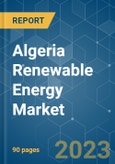The market was negatively impacted by COVID-19. Presently the market has now reached pre-pandemic levels.
Key Highlights
- Factors such as diversifying the country's economy and decreasing the dependence on the oil and gas sector are expected to drive the renewable energy market in Algeria. Moreover, diversification of the energy mix offers multiple benefits, including job creation and energy security, further promulgating the country's renewable energy market.
- However, factors such as delays in governmental approval for new projects, policy uncertainty, and lack of an efficient regulatory framework have hindered the market growth in the country.
- Moreover, Algeria is vulnerable to climate change, which demands decreased fossil fuel use. Hence, the government plans to increase the share of renewables in energy generation in the coming years, creating ample opportunity for the market players.
Algeria Renewable Energy Market Trends
Solar Energy to Dominate the Market
- Algeria’s energy requirements are heavily dependent on natural gas, which amounts to more than 90% of power generation in the country. However, the country has enormous solar energy potential. The country has 65% of solar energy share in total renewable capacity in 2021.
- According to IRENA, the total installed capacity for photovoltaic solar in 2021 was 423 MW. To harness the solar potential in the country, the government has taken initiatives, such as the Renewable Energy and Energy Efficiency Program (launched in 2011), under which the country aims to reach a total photovoltaic capacity of 13,575 MW by 2030.
- In addition, the country has also joined the Desertec Industrial Initiative, which aims to use Sahara solar and wind power to supply 15% of Europe's electricity needs by 2050. This is expected to increase the investments in solar energy projects, in turn driving the market for solar photovoltaics in the future.
- Moreover, In July 2022, According to the state-owned corporation Shaems, which supervises the project, Algeria's Solar 1,000 MW scheme is projected to generate its first power by the end of 2023. The first energy will be generated by a 30 MW solar PV park created as part of the Solar 1,000 MW project in Beni Ounif (Bechar area) by the end of 2023.
- Therefore, the above-mentioned factors, the country's solar targets, and projects are expected to drive the solar energy market during the forecast period.
Increasing Renewable Energy Demand to Drive the Market
- Conventional power generation methods like thermal power plants are finding it hard to meet this increase in demand, thus paving way for the growth of renewables. Another factor that is aiding the renewable industry is the efficient collaboration between the governments and the private sector. There is a growth in industrial investments backed by supportive government policies in renewable technologies.
- Algerian government also signed a memorandum of understanding with Dii Desert Energy, the operator of the Desertec project, which aims to create an extensive network of wind and solar installations in North Africa and the Middle East within 40 years.
- The country has set Renewable Energy targets to be achieved in two periods (2015-2020 and 2021-2030), by promoting photovoltaic, concentrated solar power (CSP), geothermal, wind, biomass, and cogeneration. By 2030, it is expected to produce a total of 22,000 MW by using renewable energy, with 12,000 MW devoted to the national market, and 10,000 MW to exports.
- The government plans to increase the share of renewables in the energy mix by more than 25% by the year 2030, by creating a new national model for the consumption of electricity with new projects aiming to advance solar, wind, hydro, and biomass power plants.
- Moreover, the government is adopting laws to define the guarantees, financial aid, and tax incentives, granted to both public and private enterprises, to raise interest in investing in the renewable energy sector, in turn driving the renewable energy market during the forecast period.
Algeria Renewable Energy Market Competitor Analysis
The Algeria Renewable Energy Market is moderately consolidated. Some of the key players (not in particular order) are Algerian Solar Company, Sarl Algerian PV Company, Zergoun Green Energy, SCET Algeria Energy, and SKTM SPA.Additional benefits of purchasing the report:
- The market estimate (ME) sheet in Excel format
- 3 months of analyst support
This product will be delivered within 2 business days.
Table of Contents
Companies Mentioned (Partial List)
A selection of companies mentioned in this report includes, but is not limited to:
- Algerian Solar Company
- Sarl Algerian PV Company
- Zergoun Green Energy
- SCET Algeria Energy
- SKTM SPA










